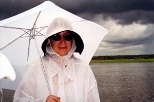"Contemporary novelists rarely write about science or technology. Margaret Atwood tackles both--and more--in one of the year's most surprising novels." So wrote The Economist about "Oryx and Crake" by Atwood, who will speak at MIT this Sunday, April 4.
"Oryx and Crake" offers a view of the future following a bioengineered apocalypse caused when short-term science outstrips long-term responsibility. As Snowman (once known as Jimmy), possibly the last human left on earth, recalls how the world fell apart, he remembers the title characters: Crake, his genius boyhood friend, and Oryx, a former child prostitute in southeast Asia.
Their inevitable love triangle is only a small part of the doom which pervades the story of runaway social inequality, genetic tinkering and catastrophic climate change.
Kirkus Reviews called "Oryx and Crake," which was shortlisted for the 2003 Booker Prize and is now available in paperback, "a landmark work of speculative fiction, comparable to 'A Clockwork Orange' and 'Brave New World.' Margaret Atwood has surpassed herself."
Author of more than 25 volumes of poetry, fiction and nonfiction, Atwood is perhaps best known for her novels, which include "The Edible Woman" (1970), "The Handmaid's Tale" (1983), "The Robber Bride" (1994), "Alias Grace" (1996) and "The Blind Assassin" (2000), winner of the Booker Prize.
In an interview with Random House, she discussed being a fiction writer in a family of biologists and scientists. "Science and fiction both begin with similar questions," she said. "What if? Why? How does it all work? But they focus on different areas of life on earth. The experiments of science should be replicable, and those of literature should not be. Why write the same book twice?"
"Please don't make the mistake of thinking that 'Oryx and Crake' is anti-science," she continued. "Science is a way of knowing, and a tool. Like all ways of knowing and tools, it can be turned to bad uses. And it can be bought and sold, and it often is. But it is not in itself bad. Like electricity, it's neutral."
While a visiting artist at MIT on April 5-6, Atwood will visit classes, tour labs and share informal meals with faculty, staff and students.
Some of Atwood's books will be available for purchase at the April 4 event, which will take place at 4 p.m. in Room 10-250. A book signing will follow the talk. No tickets or reservations are necessary. For more information, call 253-2341.
A version of this article appeared in MIT Tech Talk on March 31, 2004.






